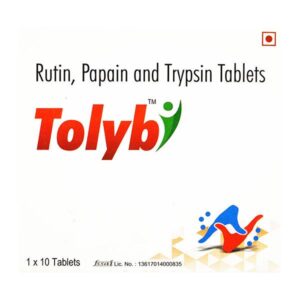PAPAIN + RUTIN + TRYPSIN
Papain: Papain is a proteolytic enzyme derived from the latex of the papaya fruit. It is widely used in various industries, including pharmaceuticals, food, and cosmetics. In medicine, papain is primarily used for its protein-digesting properties and has been utilized in wound debridement, digestive disorders, and as an adjunct therapy for certain respiratory conditions.
The mechanism of action of papain is attributed to its ability to break down proteins into smaller peptides and amino acids. It cleaves the peptide bonds of proteins, aiding in the digestion process. This enzymatic action can also help in the removal of necrotic tissue and debris from wounds by breaking down the dead tissue.
The dose of papain varies depending on the specific use and formulation. It can be administered orally in tablet or capsule form for digestive disorders, typically at a dose of 100-150mg three times a day. For wound debridement, topical preparations containing papain are applied directly to the affected area as per the healthcare professional’s recommendation.
While generally considered safe when used appropriately, papain can cause certain side effects. These may include nausea, vomiting, diarrhea, allergic reactions (such as rash or itching), and in rare cases, anaphylaxis. Individuals with a known allergy to papaya should avoid using papain-containing products. Additionally, excessive use or prolonged contact with topical papain preparations may lead to skin irritation and sensitivity.
It is important to consult with a healthcare professional before using papain, especially if you have any pre-existing medical conditions or are taking other medications. They can provide specific dosing instructions, assess potential drug interactions, and help determine if papain is suitable for your individual needs.
Rutin: Rutin, also known as vitamin P, is a bioflavonoid found in various plants and is commonly used as a dietary supplement. It is known for its antioxidant and anti-inflammatory properties and is used to help strengthen blood vessels and reduce the risk of certain cardiovascular conditions. Rutin is also believed to have potential anticancer effects and may help to improve overall vascular health.
The exact mechanism of action of rutin is not completely understood. However, it is thought to work by protecting blood vessels from damage caused by free radicals, reducing inflammation, and improving the health and elasticity of blood vessel walls. Rutin also plays a role in increasing the absorption of vitamin C, another essential nutrient with antioxidant properties.
The recommended dose of rutin can vary depending on the specific condition being treated. Typically, doses range from 200 to 500 mg per day, taken orally. It is advisable to follow the instructions provided by the product packaging or consult with a healthcare professional for the appropriate dosage.
In general, rutin is considered safe for most individuals when taken in recommended doses. However, like any dietary supplement, it may cause some side effects. Common side effects of rutin can include digestive issues such as nausea, abdominal pain, and diarrhea. Allergic reactions are rare but possible and may present as rash, itching, or difficulty breathing. If any severe side effects are experienced, it is essential to seek immediate medical attention.
It is important to note that rutin may interact with certain medications, such as blood thinners like warfarin or antiplatelet drugs like aspirin. Thus, it is crucial to inform a healthcare professional about all medications being taken before starting rutin supplementation.
As with any dietary supplement, it is always recommended to consult with a healthcare professional before starting rutin or any new supplement, especially if you have any underlying medical conditions or are taking any medications that may interact with it.
Trypsin: Trypsin is an enzyme medication used for several medical purposes. It is derived from the pancreas of cows or pigs and is used in the treatment of various conditions that involve impaired digestion or inflammation.
The main mechanism of action of trypsin is its ability to break down proteins into smaller peptides and amino acids. This aids in the digestion and absorption of proteins in the digestive system. Additionally, trypsin has anti-inflammatory properties, making it useful in the treatment of certain inflammatory conditions.
Trypsin is available in various dosage forms, including tablets, capsules, and ointments. The dosage and administration of trypsin can vary depending on the specific condition being treated. For example, in the case of pancreatic insufficiency, the usual recommended dose is 1-3 tablets/capsules taken with meals.
While trypsin is generally well-tolerated, some individuals may experience side effects. These can include nausea, diarrhea, stomach discomfort, and allergic reactions. It is important to note that individuals with known allergies to cows or pigs should avoid using trypsin. Additionally, trypsin may interact with certain medications, so it is essential to inform your healthcare provider about all the medications you are taking before starting trypsin therapy.
Overall, trypsin is a useful medication for improving protein digestion and managing inflammatory conditions. However, it is necessary to consult with a healthcare professional for proper diagnosis, dosage recommendations, and to monitor for any potential adverse effects.

